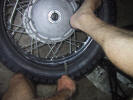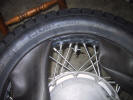
A few of the tools used in the following; hammer, tire irons (3 makes
the job easier), Pin wrench, pin spanner, valve core tool and 5 gallon
bucket. |

Place the wheel, drum side up on an inverted 5 gallon bucket, using the
cap or valve tool, remove the valve stem core and once deflated use the
palms of your hands to press down and break the bead. |

180 degrees opposite the valve stem, insert the concave side of the
spoon (face outward) between the tire bear and rim. |

Pull the tire iron toward the center of the hub. |

The bead will pop up like so...
|

Insert a the second iron 4" either side of the first and pull it down
toward the center also.
|

Now insert the 3rd spoon 4" to either side of the first two spoons and
repeat the drill. |

Remove the middle spoon. |

Insert the free spoon 4" to either side of the other two spoons and pull
it down. |

You should now be able to run either outside spoon around the rim
popping the bead free. |

More of the same I guess. |

Top bead is now free. |

Again, starting 180 degrees opposite the valve stem, lift up the free
bead... |

...reach in and pull out the deflated valve less tube... |

...pulling along each side until you end at the valve stem. Tuck your
fingers into the tire to pull the valve back through the rim hole. |

The tube is now free. Check condition and replace only if needed. All
but one of my tubes are the original Russian tubes and have over 78K
km's on them. |

Turn the wheel brake lining side up on the bucket. The tire will fall so
it is resting on the lower rim. Insert the iron so the convex face is
now toward the rim. |

Push the tip over the bottom rim lip... |

...and push the iron out and down. |

Take a second iron, go 4" either side of the first and repeat. |

You should now be able to take the palms of both hands at 1 and 11
o'clock and push downward slipping the tire off the rim. |

About 10 seconds later. One more little push and the tire will drop to
the floor. |

Inspect the rim strip and replace as needed. Have a suitable replacement
handy as the Russian strips break very easy. |

I always remove the rim strip and clean the dirt and rust off the inside
rim. It's just a big rubber band and pulls off neatly. |

While I have the wheel broke down I usually balance it and check the
torque of the spokes. This will be covered later in another section. |

Rim strip replaced |

To mount the tire, start with the wheel on the bucket brake lining side
up. |

I balance my rims and "mark" the "heavy spot" with a dot of paint.
|

Lay the tire on the rim with the "light spot" on the tire in-line
with the "heavy spot" on the rim. Most folks say to match the tire
"spot" to the valve hole but this is B.S. I'll cover this more later in
the "Balancing the Tire" section below. |

Insert the concave face of the spoon between the upper rim and lower
tire bead and push the iron out and down. You will need to put your foot
or knee on opposite the spoon to keep the tire from lifting up. |

Insert a second spoon 4" either side and push out. You should be able to
now work both spoons AWAY from each other popping the tire on. In the
picture above, I have one spoon hooked through the spokes with my foot
holding the rim down while a take a picture...not hard at all! |

You may find both tire beads want to go on the rim...let them. It's easy
to pop the top bead off again.
Now, lay the deflated CORE LESS tube on the rim with the valve stem
lined up with the valve hole in the rim. |

See...no valve core. |

With one hand lift up on the upper (free) tire bead...with the other
hand stuff the tube into the tire with the valve stem in line with the
hole in the rim. |

Stuffed. |

Now the trick! Lift up the tire each side of the valve stem and fold the
tube, accordion style, while keeping the valve pretty much in line with
the rim hole. |

With one hand, reach in BEHIND the tube, behind the valve stem and close
your fingers guiding the stem through the hole. You will need to do just
a hair of manipulating to thread the hole, but the folds in the
tube will give you plenty of leash. |

It takes longer to spin the core tool on than it does to get the stem
through the rim. I put the core tool on to prevent the stem from going
back into the rim.
Now center the stem in the hole and gently pull the folds in the tube
away from the stem. DO NOT allow the stem to cock in the hole. If it
does, straighten it out before continuing. |

The correct method for inserting the tube into the tire is to begin 180
degrees opposite the valve stem and finish at the stem...Not as pictured
here. |

Tube is now fully inserted with top bead free. |

Remove core tool... |

...replace valve core... |

...and use tool or cap to seat valve core. |

Now fill the tube with enough air to wear it just begins to take shape. |

There should be no wrinkles, but it should still be very soft. This will
prevent pinch punctures from the tire iron when seating the top bead. |

Begin seating the bead 180 degrees opposite the valve stem.
Insert the spoon with the concave surface facing the rim and push out
and down. |

Should look like this...
|

...continue every 4" with another spoon and do the same... |

Take the middle spoon and go 8" or so to the outside of either end
spoon. In this picture the middle spoon went to the 10 o'clock position. |

You should now be able to take the spoons and work them from the 10 and
2 o'clock positions down toward the valve stem. |

At this point it will get a little difficult to get the bead over the
rim... |

...it is easier to rest your knee or foot opposite the valve stem, lean
across the wheel and press down on the spoons...a little difficult to
show while taking your own pictures. |

If you did your set up work well, the tire "mark" and rim "mark" (or
valve stem hole) will still be lined up and... |

...the valve stem will be vertical not cocked. |

Now put about 20lbs of air pressure in the tire. This will seat the
bead. |

Remove the valve core to quickly deflate the tube. This pulls the tube
away from the tire to prevent pinches. Inspect the rim where the tire
contacts it and look for any place where the tube is poking through.
There should not be any. |

Replace the core... |

...inflate to maximum rated p.s.i. |

My pumping station. |

Tire is now ready to be balanced. |